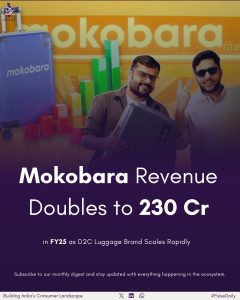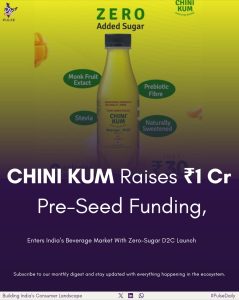Nasher Miles, a leading name in India’s D2C luggage space, is all set to expand its retail footprint with plans to launch 20–25 exclusive brand outlets (EBOs) by the end of this financial year. This strategic move aligns with the brand’s larger ambition to reach 100 stores across the country in the next two years, signaling aggressive growth in the D2C ecosystem India.

As a prominent player in the direct-to-consumer India landscape, Nasher Miles currently operates largely through digital platforms. The upcoming launches—three in Mumbai, two in Hyderabad, and one in Ahmedabad—mark a major push into tier-I cities, contributing to the D2C expansion plans for FY25.
While the brand strengthens its D2C retail vs ecommerce strategy, it is also rapidly scaling via quick commerce D2C platforms such as Zepto, Blinkit, and Swiggy Instamart. Remarkably, even high-ticket items like trolley bags priced between ₹2,000 and ₹3,000 have found traction in quick commerce, contributing nearly 8% of the brand’s total sales. CEO Lokesh Daga revealed that this channel is growing at a rate of 10% month-over-month and is projected to contribute 15% by FY25-end.
The Indian D2C updates from Nasher Miles don’t stop there. In a significant supply chain shift, the brand has moved 75% of its manufacturing to India over the past 18 months, down from a prior 90% reliance on China. The change, initially tested under a sub-brand called Stony Brook by Nasher Miles, has not only improved gross margins by 20–25% but also aligns with the rising demand for sustainable D2C brands and local sourcing in India’s D2C industry news.
Though the brand experienced a temporary dip into loss in FY24, attributed to brand-building and manufacturing transitions, it has bounced back into profitability in FY25. Nasher Miles’ D2C startup valuation received a boost after a $4 million D2C funding round in July 2024, led by Singularity Early Opportunities Fund, with participation from top names including Narendra Rathi (SoftBank Vision Fund) and Sulabh Arya (Goldman Sachs Growth Equity)—bringing the post-money valuation to $30 million.
As part of its omnichannel D2C strategy, the brand plans to raise further capital post-festive season—crucial months that account for nearly 60% of its annual sales. These funds will likely support D2C product launches, scale quick commerce D2C operations, and fuel the goal of diversifying beyond trolley bags.
Currently, trolley bags contribute nearly 95% of the company’s revenue. However, Nasher Miles is actively boosting its portfolio of backpacks and travel accessories, eyeing a double-digit revenue contribution from these new verticals by year-end—keeping pace with D2C market trends 2025.
With growing investor confidence and a sharp focus on D2C business model India, Nasher Miles is emerging as one of the fastest-growing D2C brands. It exemplifies how strategic offline expansion, quick commerce agility, and category diversification can power sustainable growth in the competitive D2C brands India space.








